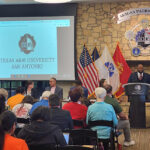
By Alma Linda Manzanares
Students transferring from the Alamo Community College District may be at a disadvantage after a decision to replace a three-hour humanities course requirement with a three-hour student development course.
While the change does not affect the transfer process, Dr. Edward Westermann, Texas A&M-San Antonio Faculty Senate vice president, and history assistant Professor Amy Porter agree replacing humanities courses limits a student’s exposure to the critical thinking and educational background needed to understand junior and senior level courses.
“My concern is part of the reason we study literature, philosophy and history is because of the way it helps us situate our own lives in this world and understand the things around us,” Westermann said.
The Texas Higher Education Coordinating Board approved the Alamo Colleges 2014-15 core curriculum, which includes EDUC 1300, Learning Framework, as a mandatory course in the social and behavioral sciences section of the college core for all arts and sciences and applied science degree plans.
The additional humanities requirement was cut because the core curriculum cannot exceed 42 credit hours.
According to the course description, Learning Framework is “a study of research and theory in the psychology of learning, cognition and motivation; factors that impact learning; and application of learning strategies.”
Dr. Jo-Carol Fabianke, Alamo Colleges vice chancellor of academic success, described the course as a “foundation course” designed to help students develop a better awareness of how to learn and succeed in college.
She said the course helps achieve the core curriculum’s goals, designed to teach critical thinking, communication, empirical and quantitative skills; teamwork; personal and social responsibility.
“When you take your first 42 hours, it is to give you a broader perspective about things that are going to influence your life. It’s about being a better citizen,” she said. “So it’s not about you may learn some very specific things (for a particular job field) while you’re taking a humanities course, or a science course, or any other course.”
Porter said the humanities already help meet those core goals by setting a foundation for developing critical thinking skills, learning to analyse, articulating questions and problems, and picking evidence to defend an argument or a thesis.
“Beyond that, there’s a social need to be able to talk about a wide variety of areas and I think the humanities courses are very helpful in preparing students for these social situations,” she said. “You need that broader base, that broader education to be able to talk to people in and outside of the workplace.”
Westermann said Learning Framework is not a bad course, however, the Alamo Colleges could require incoming students to take a seminar or introductory course without sacrificing another humanities offering.
“My problem is it’s replacing a requirement that is actually much more profound for the development of students and their ability to think about the world in which they live in and to understand the world in which they live in,” he said.
Fabianke said the district chose to require Learning Framework in the core so the course applies towards a student’s four-year degree.
“No matter what you think about doing away with the other humanities, for students, this is better assurance that it is going to be accepted and count toward a four-year degree,” she said.
Changes in the core at the Alamo Colleges do not directly impact A&M-San Antonio because students still transfer with a complete core, university transfer advisers Deborah Kanipe and Kristopher Scheneman said.
“There’s room for two of the categories to be at the discretion of the institution. That’s how come everybody’s core right now is a little bit different than everybody else’s because of what we call institutionally designated options,” Kanipe said.
The core between A&M-San Antonio and Alamo Colleges was already different because the university requires a global learning course, while the colleges have an additional humanities course.
“So if they change their additional humanities to a student development, that’s really not going to cause any additional complications,” Kanipe said.
Faculty uproar
The changes to the core curriculum stirred uproar from college administration, faculty and students in the Alamo Colleges.
Faculty criticized Alamo Colleges Chancellor Bruce Leslie for not including them in the curriculum decision. The THECB requires faculty draft curriculum rather than administration.
All organized faculty groups within the five colleges have publicly opposed the change. Those groups include the Alamo Community College District Faculty Legal Association, which discusses current issues and the possible legal ramifications for faculty; and Super Senate, which combines all five college’s Faculty Senates.
After Northwest Vista Colleges Faculty Senate sent a letter of opposition to Leslie, he released an 11-page response Feb. 5, detailing the history and development of the core change.
During a Dec. 6 meeting, the PVC, consisting of the five vice chancellors, five college presidents and Leslie, made the final decision regarding the change. Leslie noted he knew faculty opposed the change.
“I indicated that I understood faculty would oppose this decision … but in order to initiate the course in 2014 and in the best interest of the students, I was making the decision to include it in the core and ask the group to support the decision,” he wrote.
In addition, Leslie’s letter said the PVC was “determined to integrate the “7 Habits of Highly Effective People” into the culture of Alamo Colleges … the Learning Framework course, required for all students, was the ideal place to introduce the foundation of Principle Centered Leadership and begin the integration across the curriculum.”
Alamo Colleges would help expand the FranklinCovey Co. market, the company behind “7 Habits of Highly Effective People” by Stephen Covey, spending about $700,000 on Covey training materials.
“There’ve been a lot of people who’ve said Learning Framework is going to be a Covey course, well it’s not,” Fabianke said, responding to the fuel from faculty.
She said faculty need to prioritize student needs over dedication to their discipline.
“You could argue that 20 hours of humanities is probably really good for people, but the psychology people would say a bunch of hours in psychology is really going to be good for everybody,” she said. “Somewhere in there you have to figure out where’s the balance between all those needs.”
Westermann and Porter said the intensity of widespread faculty opposition did not surprise them.
“Unfortunately, what I think is happening in some areas of education is that the business model is outweighing the philosophical or educational goal of liberal arts education or higher education,” Westermann said. “So, crunching numbers and looking only at dollars and cents is starting to override some of the larger issues about what it is that we want higher education to do for individuals and how it enables them to interact or understand the world they live in.”
Westermann and Porter agreed that the humanities and liberal arts discipline is seen as “not necessarily a direct payback kind of major.”
“I think that’s very shortsighted,” Westermann said. “We don’t need just technical experts, we need technical experts who understand the philosophical, the moral, the ethical implications, the historical implications of what they’re doing and that’s what humanities provides; a basis for creating that context for students and individuals.”
A&M-San Antonio Faculty Senate plans to address the issue 11 a.m. Friday in Room 353 in the Main Campus Building.






